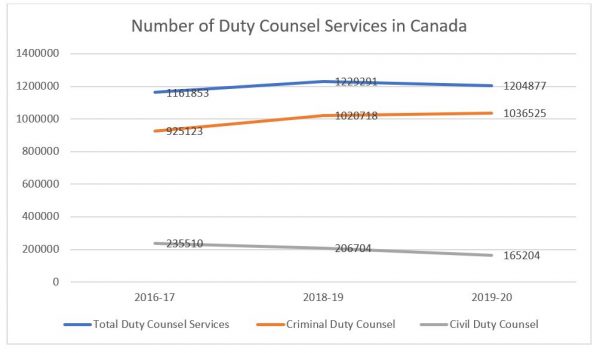
The most recent edition of Legal Aid in Canada by the federal Department of Justice reports that legal aid plans in Canada provided 1.2 million free duty counsel services; to people in-court and in-custody accused in criminal courts, appearing unrepresented in civil courts primarily in family court and at immigration hearings during 2019-2020.[1] The majority of duty counsel services were for criminal matters (86%), with 14% of services provided in civil matters. Duty counsel is an important part of legal aid in Canada and 1.2 million duty counsel services is an important milestone. The achievement of this milestone is being celebrated on-line by the Association of Legal Aid Plans of Canada by holding a National Duty Counsel Day on October 27, 2021. Readers can follow the event at https://www.knowdutycounsel.ca/.
Duty counsel does much more than keep the wheels of the court turning, although they do that admirably well. Courts are complex and fast-paced environments that are confusing for people without legal training. Even though there is no formal right to legal representation in Canada duty counsel is recognized as an important part of assuring a fair hearing. In criminal proceedings, prior to the disruption caused by COVID, judges would normally ask unrepresented accused if they have had the opportunity to speak to duty counsel and would encourage them to do so before the case proceeds if they had not. Duty counsel is even more than that. The discourse on access to justice now emphasizes people-centered justice in both civil and criminal justice.[2] The duty counsel lawyer is often the first person an unrepresented accused or litigant will meet. Duty counsel is the face of the justice process, telling people who are often unable to navigate the system on their own: I am here to help you. Duty counsel lawyers are essential actors in Canadian courts. More of them are needed and they need more time to do their work.
The 1.2 million duty counsel services do not include Brydges duty counsel. In Canada following a 1990 Supreme Court decision,[3] accused persons who are detained by the police have a Constitutional right to speak to legal counsel before being interrogated. Section 10b of the Charter guarantees the right to retain and instruct counsel without delay and to be informed of that right. Section 24 (2) states that if evidence is obtained in a manner that infringes an individual’s Charter rights the evidence shall be excluded. Legal aid plans in Canada provide this essential legal advice by means of 24-hour toll-free telephone services. The advice that can be provided by telephone may be quite limited – “don’t talk until you see a lawyer.” However, after the formal requirement of speaking with a lawyer has been satisfied, the police are free to interrogate accused persons. Trauma and extreme stress, mental health issues, intoxication or the effects of substance abuse experienced by the accused make the practical reality of providing the Charter protection while detained problematic. Making Brydges duty counsel more robust is fraught with difficulties, but it is an area of legal aid in which more should be done.[4]
Duty counsel is an important aspect of legal aid in Canada. Duty counsel services are growing in numbers overall. The data suggest that there may be considerable scope for expanding duty counsel especially in civil matters. Duty counsel has been disrupted by COVID during the past year and a half with courts suspending in-person hearings and in-person contact being limited in order to meet public health requirements. It will be important to concentrate on expanding and improving duty counsel services as the justice system emerges from the pandemic. Duty counsel will be an even more important part of the evolution of legal aid in Canada in the coming years.
By Ab Currie, Ph.D.
Senior Research Fellow,
Canadian Forum on Civil Justice
_________________________________________
[1] Legal Aid in Canada 2019-20, Research and Statistics Canada and Legal Aid Directorate, Department of Justice Canada, 2021.
[2] Task Force on Justice, Justice for All – The report of the Task Force on Justice: conference version.
(New York: Center on International Cooperation, 2019), available at https://www.justice.sdg16.plus/.
[3] R vs Brydges 1 S.C.R. 190 (1990).
[4] For background, see e.g. Simon Verdon-Jones and Adamira Tijerino, A Review of Brydges Duty Counsel Services in Canada, Legal Aid Research Series, Department of Justice Canada, 2004.
The post Legal Aid Reaches a Milestone Providing 1.2 Million Duty Counsel Services in Canada appeared first on Slaw.

